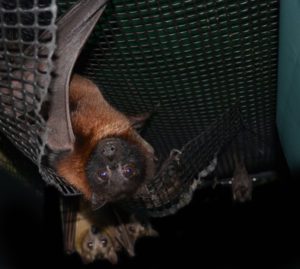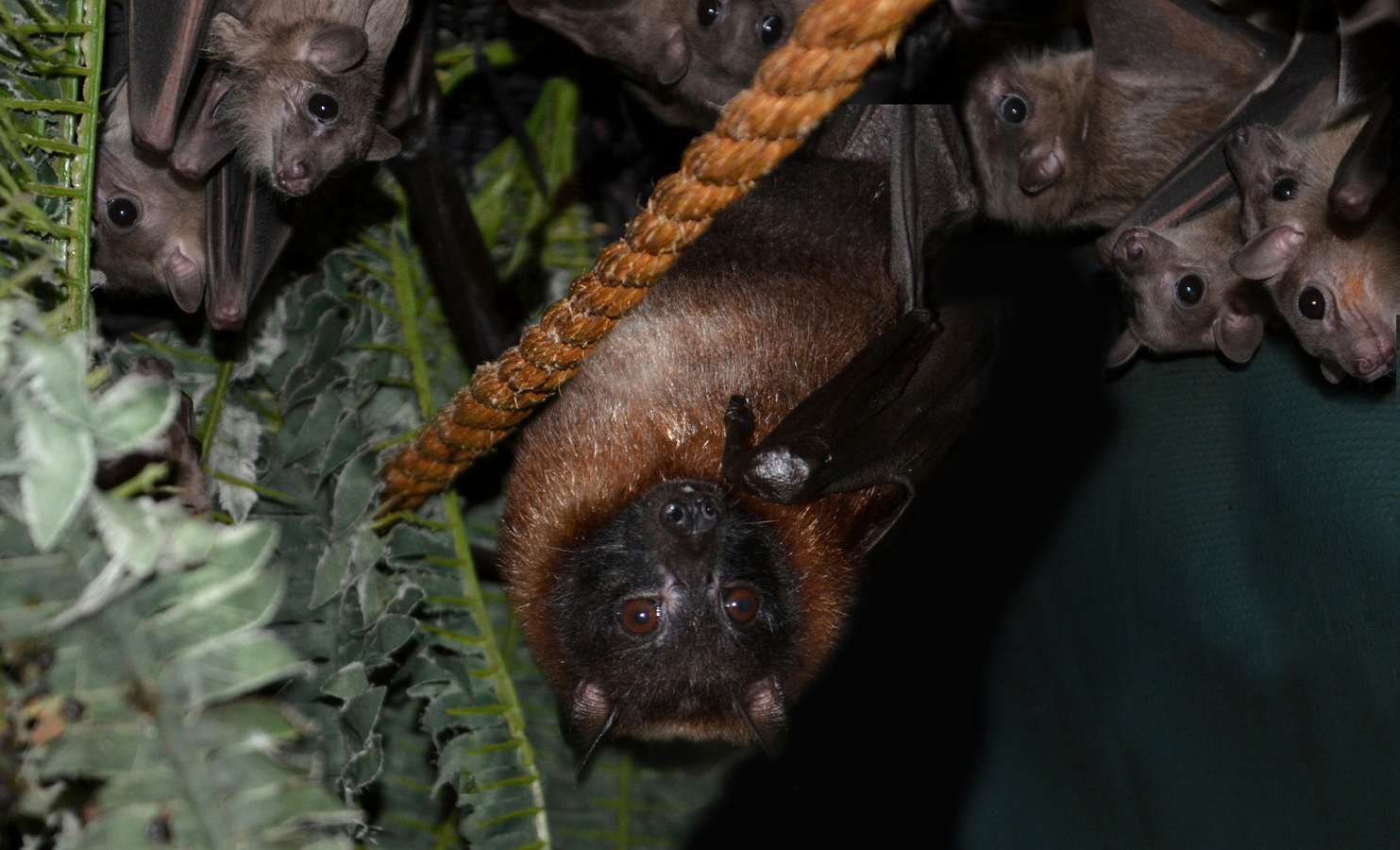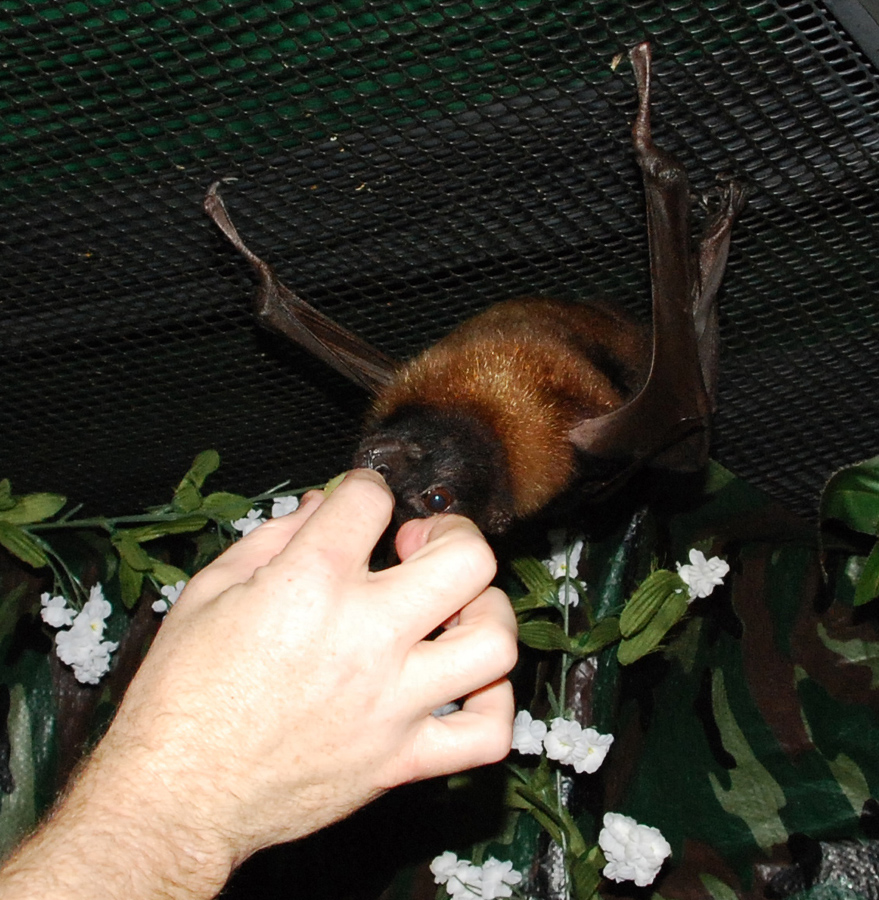By Mitch Gilley
I’m loathe to admit that I have favorite bats among those we care for, but I am particularly drawn to a few of them. There’s Ichabod, for starters, the formerly injured and now chubby free tail who is responsible for me being at Bat World to begin with. It goes without saying that he would mean quite a lot to me.
With the fruit bats, though, it’s always been Poppy. You might have expected me to say Peekaboo, but that’s backwards; Peekaboo has favorite humans. This arrangement cannot be reversed.
It’s just that the tragedy of Poppy’s history is palpable. She spent most of her life at a zoo in Canada where she was forced to keep a diurnal sleep schedule and endure exhibitions for the crowds of visitors. That she was profoundly unhappy there is evidenced by the warnings we received when she was sent to us. Look out, Poppy likes to bite.
From day one, Poppy has never tried to bite any of us for any reason whatsoever. She has ample chances at treat time, but not only does she never bite, she’s actually very careful in taking the treat from our fingers.

Still, Poppy remained very, very shy. With her past, who could blame her? As one of the largest bat species on earth, she towered over the African fruit bats. She’d no longer be mistreated, but I feared she’d always be lonely, and that there was nothing we could ever do to truly fix it for her. Every time I brought her the traditional bit of papaya at treat time, I’d see sadness and trepidation in her eyes, and it broke my heart every single time. Yes, she was safe, and yes, she’d never be abused, but after what she suffered, I wanted her to be happy. She deserved to be happy.
It wasn’t just her eyes, nor a flight of imagination extrapolated from what I knew of her background. When we’d bring her that chunk of papaya, she’d hide her face from us. My coworker Angela and I quickly figured out that she was extremely easily startled, and that if we approached her slowly and called out her name in a soft tone of voice before peeking into her roost, she was a little less nervous. It was a little thing, but it was something we could do to make her more comfortable, and we did it religiously thereafter, and still do.
It went like this for weeks after I arrived, until one day I went to her roost with her papaya only to find that she wasn’t there. Panic ensued, and Angela and I swept through the enclosure with as much haste as was possible without frightening the other bats until she spotted Poppy in a very peculiar place: the roosting area of the Egyptian fruit bats. She had settled into the back and blended into the dimness very well with her dark fur even as she dwarfed all the dozens of bats around her. It was only her big orange eyes that allowed Angela to find her, and it only occurs to me now as I write this that it was because she made eye contact with Angela. That was something that Poppy rarely did with us, if ever.
The next day, she had returned to her usual solitary roost, but every two or three weeks there would be a day where we’d find her with the Egyptians again. We all wondered what Poppy’s reasons for spending the day with them were, and while I was tempted to observe her as much as I could, both her and the Egyptians are easily disturbed, and it goes without saying that their comfort did and will always take precedence over my curiosity.
Weeks passed, as they do, until recently we found her with the Egyptians two days in a row, which she’d never done before. Even more interestingly, that second day found her behaving very differently: she no longer hid her face from us. She took her papaya without hesitation. She looked me squarely in the eye, and I could swear that I didn’t see any of the sadness I always saw before. At the time I shrugged it off; I wasn’t entirely sure that those sad eyes weren’t a figment of my sometimes overly romantic imagination, although in retrospect it made perfect sense. Bats are highly social creatures, and over the years Amanda has seen enough anecdotal evidence to come to believe that loneliness can actually severely impact their health, and is actually fatal in extreme cases. It makes perfect sense that Poppy would find her boldness with the Egyptians, even though they aren’t her species. Bats don’t concern themselves too much with such arbitrary divisions. To them, bats are bats.

As of today, Poppy has never returned to her old roost, and is a totally different bat. Today she waits expectantly for her treat and takes it eagerly. She doesn’t shy away, and will even let me pet her without showing any nervousness or uncertainty. Best of all, though, she seems happy.
We’ll never know exactly what caused the change: it could have been safety in numbers, perhaps Peekaboo’s brazenness rubbed off on her, maybe we were just a few pieces of papaya away from gaining her full trust all along, but somehow overnight she found a boldness that I never expected to see in her.
What I do know, now, is that it happened so organically despite its suddenness that it was only in the last couple of days as I was telling the story to someone that I realized how significant this is. We’ve had many bats that were tragically orphaned, many others that endured ill treatment at the hands of people who didn’t know or didn’t care how to properly tend them, but Poppy had endured years of mistreatment. She was forced to perform and subjected to crowds and noise when her circadian rhythm dictated that she should have been sleeping, and finally subjected to what must have been a terrifying international journey, finding herself with us at the end of it. Many bats who suffer much less never forget it, and at best will only tolerate our presence, and then only if we don’t come too close. It pains us, of course, that we can’t convey to them that they are safe, finally, but ultimately we respect their wishes and keep our distance as best we can as we tend to the colony.
Poppy, however, with the help of her new and comparatively diminutive best friends, has overcome her past. The difference in her is truly amazing. They could have told me we’d taken in a new flying fox as an April Fool’s joke, one that looks exactly like Poppy, that took up the exact same spot in the Egyptians’ roosting area, that also insists on papaya at treat time, and I’d have believed it.
Words can’t possibly convey to you how utterly great it is to see Poppy out of the shell she hid in for so long, but many of you have cared enough to sponsor her through the Adopt-a-Bat program, and we felt we owed it to you to try.
The vast bulk of the credit goes to Poppy herself, and the accepting nature of bats in general. They don’t see her huge size or her orange eyes or her fox-like face; all they see is another bat. That makes it their success story more than ours, and it couldn’t be a more beautiful one.


